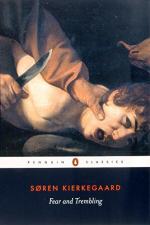|
This section contains 876 words (approx. 3 pages at 400 words per page) |

|
Fear and Trembling Summary & Study Guide Description
Fear and Trembling Summary & Study Guide includes comprehensive information and analysis to help you understand the book. This study guide contains the following sections:
This detailed literature summary also contains Topics for Discussion on Fear and Trembling by Soren Kierkegaard.
The following version of this book was used to create this study guide: Kierkegaard, Soren. Fear and Trembling. Edited and translated by Howard V. Hong and Edna H. Hong. Princeton University Press, 1983.
Beginning with a short preface excoriating the philosophical trends of his day, Soren Kierkegaard, through the pseudonym of Johannes de Silentio, asks what the significance of faith is, what its function is, and how it is to be attained. He turns to the famous story of the binding of Isaac in Genesis 22 and in the “Exordium” section he provides four very strange and cryptic variations of this event meant to delve into Abraham’s psychological state of mind. De Silentio gives absolutely no commentary on these extra-textual readings and each concludes with a short parable that speaks to the possible dynamics of the parent-child relationship.
In the next section, “Eulogy on Abraham,” de Silentio praises Abraham as a hero of faith, but he does so without the empty, pious clichés that do not question his prescriptive status. Abraham is a great hero of the faith not only because he offered his best, but because he expected the impossible and struggled with God. This faith is a faith in the preposterous, the absurd, and it is empathetically faith for this life, not a life to come.
In the “Preliminary Expectoration” section, de Silentio outlines some of the basic terms of his argument. He is interested in the theme of anxiety as it pertained to Abraham’s story, a type of anxiety that is often omitted in pious examinations of the biblical passage. This anxiety emerges due to the contradiction between Abraham’s ethical obligation to Isaac and his religious obligation to God. For de Silentio, the key to understanding this anxiety lies in Abraham’s faith as a single individual. In order to explore this dynamic, de Silentio posits two types of individuals: the tragic hero and the knight of faith. The tragic hero makes the movement of infinite resignation, but is unable to make the double movement of faith that typifies Abraham’s position. As a knight of faith, Abraham, goes beyond this. He acts by virtue of the absurd and expects the impossible.
“Problema I,” explores the first of three dialectical aspects that de Silentio believes are implicit in Abraham’s story. To begin, de Silentio examines the question of whether there is a teleological suspension of the ethical. The ethical, according to him, functions as a universal, mediating principle that is applicable to all persons in all situations. It is a program for moral action. On de Silentio’s reading, the ethical universal is superior to the single individual, subsuming identity. Abraham does not act in accordance with the ethical universal and, instead, elevates himself as a single individual over and above the universal. He acts with different, higher ends in mind. Abraham knows that sacrificing Isaac violates the ethical universal, but he acts regardless. As a knight of faith, then, Abraham performs a teleological suspension of the ethical, while the tragic hero, through the movement of infinite resignation, remains wholly within the realm of the ethical universal.
The second dialectical aspects de Silentio examines in “Problema II” is whether Abraham has an absolute duty to God. This problem builds upon the first. The teleological suspension of the ethical assume that there is some higher end or telos to which one should appeal. This higher end is Abraham’s duty, obedience, and responsibility to God. But, crucially, this duty is expressed internally through the movement of faith. Because this interiority is higher and more significant than exteriority, the knight of faith is incapable of being understood by outside parties. He lives in complete tension and contradiction and only he himself can decide when and how to act on faith by virtue of the absurd.
In the “Problema III” section, de Silentio asks whether it is ethically definisble for Abraham to conceal his action from Sarah and Isaac. His analyses here extend and build upon “Problema II.” Because the knight of faith cannot make himself understandable, he cannot speak. While the ethical universal demands full disclosure, he remains hidden. His actions and his decision cannot be translated into the terms of the ethical universal. The author spends the majority of this section exploriung a variety of stories that elucidate the dynamics between hiddenness and disclosure, including Euripides’ account of Agamemnon and Iphigenia, the myth of Amor and Psyche, the story of the Oracle at Delphi found in Aristotle’s “Poetics.” In each case, disclosure is chosen over hiddenness either for aesthetic or ethical reasons. With Abraham, of course, things are different. He remains silent, hidden, and, as such, he attains the status of the knight of faith.
De Silentio concludes the text with a short “Epilogue” that recapitulates the major themes of the argument and extolls the virtue of faith. Once again, he aims his critique at philosophical schools of thought that lionize the ethical universal, while neglecting the singularity of the unique individual in his single situation. While the tragic hero operates within the ethical universal, the great knights of faith like Abraham plunge fully into the paradox of existence and act on faith by virtue of the absurd.
Read more from the Study Guide
|
This section contains 876 words (approx. 3 pages at 400 words per page) |

|



